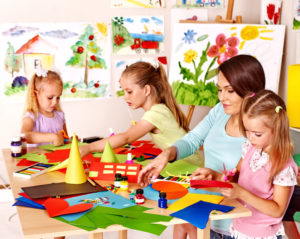 Between 1990 and 2013, the percentages of three- and four-year-olds enrolled in preprimary programs increased to 42% and 68%, respectively. Clearly, finding the right preschool is a top priority for many American families. However, because approaches to early education vary so widely, it can be tough to know what kind of philosophy will serve your child best. A great preschool experience can allow a child to receive an even higher quality education later, so choosing a preschool for your child can be a high-stakes decision.
Between 1990 and 2013, the percentages of three- and four-year-olds enrolled in preprimary programs increased to 42% and 68%, respectively. Clearly, finding the right preschool is a top priority for many American families. However, because approaches to early education vary so widely, it can be tough to know what kind of philosophy will serve your child best. A great preschool experience can allow a child to receive an even higher quality education later, so choosing a preschool for your child can be a high-stakes decision.
Research has found that children fare best when they are able to participate in academic preschool activities and learn through play. If you embrace a mixed philosophy — meaning that you understand the benefits of academic preschool but want to make sure your child also gets the chance to play and develop social skills with their peers — here are a few things to look for in early education programs.
- An emphasis on literacy
Preschoolers are not expected to know all their letters and numbers going in to preschool, but literacy is a good way to judge the academic integrity of a preschool program. Letters, words, and books should be available to children. Pre-reading skills can be developed in a multitude of ways, from traditional learning to involvement in art, story time, and crafts can support literacy and writing skills later on. - Periods for play and social activities
A lot of parents fail to realize that academic preschool activities extend beyond classroom or book learning. Learning through play is just as valuable, so it’s key that parents ask about whether social learning will be part of their child’s daily routine. Play allows a child to understand sharing, compromise, language, and emotional processing, all of which are necessary for grade school readiness. Look for an academic preschool that understands play is a vital part of the learning equation. - Ways to incorporate math and science
Although addition and complex experiments may not be included in preschool programs, there are ways to encourage an understanding of numbers and science early in a child’s education. Counting, arranging, and understanding spatial relationships can act as the building blocks for math, as can problem-solving and critical thinking activities. High-quality preschools will also try to capture students’ interest in the way the world works by incorporating interactive activities in science such as, basic experiments for this age group.
Finding a program that embraces your philosophies and incorporates important academic preschool activities can be a challenge, but parents also need to make sure play is included in these routines, too. During a visit, be sure to ask questions pertaining to a facility’s overall philosophy and how their activities support that philosophy. This will give you a good idea of how your child will learn and grow during their time as a student there.


